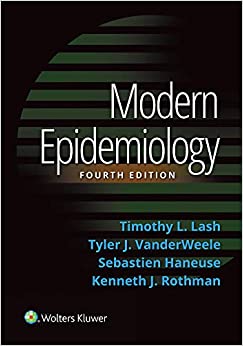Now in a fully revised Fourth Edition, Modern Epidemiology remains the gold standard text in this complex and evolving field. This edition continues to provide comprehensive coverage of the principles and methods for the design, analysis, and interpretation of epidemiologic research. Featuring a new format allowing space for margin notes, this edition
• Reflects both the conceptual development of this evolving science and the increasing role that epidemiology plays in improving public health and medicine.
• Features new coverage of methods such as agent-based modeling, quasi-experimental designs, mediation analysis, and causal modeling.
• Updates coverage of methods such as concepts of interaction, bias analysis, and time-varying designs and analysis.
• Continues to cover the full breadth of epidemiologic methods and concepts, including epidemiologic measures of occurrence and effect, study designs, validity, precision, statistical interference, field methods, surveillance, ecologic designs, and use of secondary data sources.
• Includes data analysis topics such as Bayesian analysis, probabilistic bias analysis, time-to-event analysis, and an extensive overview of modern regression methods including logistic and survival regression, splines, longitudinal and cluster-correlated/hierarchical data analysis, propensity scores and other scoring methods, and marginal structural models.
• Summarizes the history, specialized aspects, and future directions of topical areas, including among others social epidemiology, infectious disease epidemiology, genetic and molecular epidemiology, psychiatric epidemiology, injury and violence epidemiology, and pharmacoepidemiology.
• Reflects both the conceptual development of this evolving science and the increasing role that epidemiology plays in improving public health and medicine.
• Features new coverage of methods such as agent-based modeling, quasi-experimental designs, mediation analysis, and causal modeling.
• Updates coverage of methods such as concepts of interaction, bias analysis, and time-varying designs and analysis.
• Continues to cover the full breadth of epidemiologic methods and concepts, including epidemiologic measures of occurrence and effect, study designs, validity, precision, statistical interference, field methods, surveillance, ecologic designs, and use of secondary data sources.
• Includes data analysis topics such as Bayesian analysis, probabilistic bias analysis, time-to-event analysis, and an extensive overview of modern regression methods including logistic and survival regression, splines, longitudinal and cluster-correlated/hierarchical data analysis, propensity scores and other scoring methods, and marginal structural models.
• Summarizes the history, specialized aspects, and future directions of topical areas, including among others social epidemiology, infectious disease epidemiology, genetic and molecular epidemiology, psychiatric epidemiology, injury and violence epidemiology, and pharmacoepidemiology.











